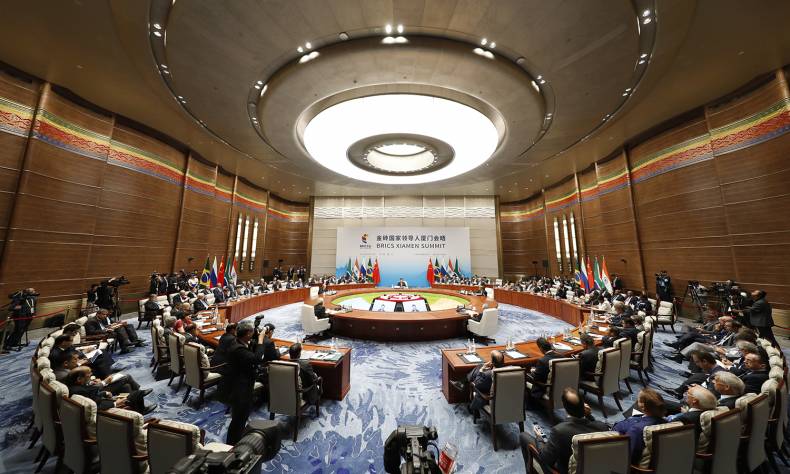
Ambassadors on BRICS Plus
Then how do other developing countries make of the proposal? What opportunities does the BRICS Plus promise to them? To get some insight about these, China Today interviewed ambassadors of Iran, Georgia, Nepal, and South Sudan to China as well as two diplomats from Argentina and the Hashemite Kingdom of Jordan.
By staff reporter Zhang hui
BRICS Plus, as a model of expansion, was proposed by China on the basis of successful practices in former BRICS Summits. It is sought to establish widespread partnerships between BRICS member countries and other developing countries through dialogues and cooperation, expand our circle of friends, and shape the BRICS mechanism into an influential cooperation platform for South-South cooperation, so as to better reflect the common ground and collective will of the developing countries.
Then how do other developing countries make of the proposal? What opportunities does the BRICS Plus promise to them? To get some insight about these, China Today interviewed ambassadors of Iran, Georgia, Nepal, and South Sudan to China as well as two diplomats from Argentina and the Hashemite Kingdom of Jordan.
Iranian Ambassador to China Ali Asghar Khaji
Ali Asghar Khaji
“Since its founding, the BRICS cooperation mechanism has been representing a new cooperation concept, and played an important role in giving a voice in the international community on behalf of the developing world. The Iranian government showed its support to the BRICS Plus proposal when it was first put forward. As an important developing country in the region of North Africa and West Asia, Iran is poised to strengthen its cooperation with China under the framework of the Belt and Road and the BRICS Plus. In addition, we also hope China as a leading developing country, can play a bigger role in advancing cooperation among developing countries on such aspects as economy, security and social development.”
Georgian Ambassador to China David Aptsiauri
David Aptsiauri

photo:Wang kai
“I think it’s a quite new model for cooperation of industrial countries and most of them have enormous resources, enormous economic potential and good prospects. Mostly importantly, they find out such a model of cooperation that can make progress and minimize risks. ”
Nepal’s mbassador to China, Leela Mani Paudyal
“BRICS, as an economic platform, participating by more and more developing countries to have opportunities to benefit from the economic development of the BRICS countries. Let’s see, we’re quite optimistic about that. That would be a good opportunity and prospect for countries like Nepal. I said we were quite optimistic. We’ll find more market for our products to sell and we’ll benefit from the capability that BRICS countries have. We’ll see the opportunities to share the technological advancement they’ve made. So we’ll also be able to give our economy the new technology they developed. It would be a new opportunity for countries in the region, particularly developing countries.”
South Sudan’s Ambassador to China Raphael Nhial Kulang
“It’s wonderful. It’s a very good program. It will make most of countries to learn, particularly African countries.”
Vice Ambassador of Argentina to China Gonzalo Sabate
Gonzalo Sabate
“For Argentina, it would be a good thing to be in BRICS. We’re in the G20. We’ll organize (the G20 Summit) next year; China did last year the G20. We’re in the level of development to be in the BRICS group. We’re not part of it, because we’re not the founder of the BRICS.”
Minister Counsellor, Embassy of the Hashemite Kingdom of Jordan Hamzeh Al-Omari
“Of course, we’re happy to hear that. You know, before that, we’re happy to be part of the Belt and Road Initiative. Yes, of course, we’ll be more than happy to be invited as possible to the BRICS Plus, to see the opportunities, adventures, joint ventures that we can make use of, and the all time cooperation with regard to development, about human development, industrial development and environment, so on and so forth.”
Source: China Today
 Facebook
Facebook
 Twitter
Twitter
 Linkedin
Linkedin
 Google +
Google +












